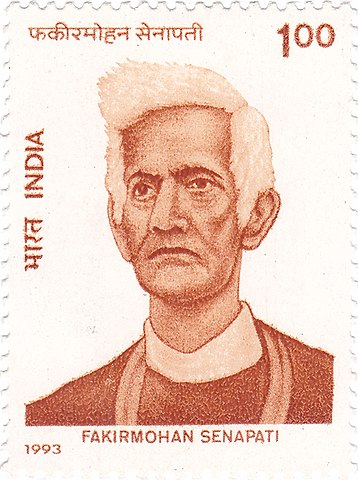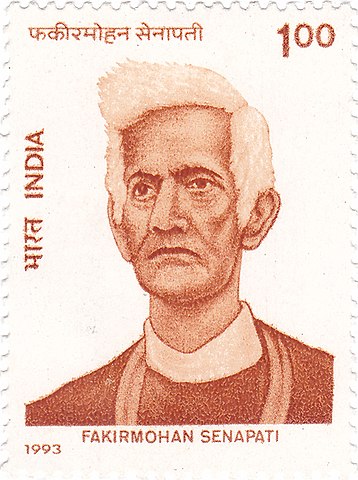Ramachandra Mangaraj, Champa, Bhagia and Saria are such characters who can never be erased from the mind of a Odia novel reader. A criticized narration by Fakir Mohan Chha Mana Atha Guntha about the cruel and torturing nature of the feudal land lords during the colonial period, Chha Maana Atha Guntha (Six Acres and A Third) is a true treasure of Odia novels ever created. The humor and parody used by the father of modern odia literature showcases the works of a dedicated writer. The novel even after so many years is eternal.
Probably penned in the starting of the nineteenth century, Chha Maana Atha Guntha was published in 1897. It is sought to be the first novel in Odia language. The main theme of the novel deals with the exploitation of landless peasants by a feudal Lord in British India. It is also considered to be first of its kind in the history of Indian literature as well.
Fakir Mohan Senapati, The Author
Fakir Mohan Senapati is regarded as the father of Odia literature. He was born in 1843 in Balasore. He lost his father and mother at a very young age. the complexity and struggles of life that Fakir Mohan had gone through emerged him as a prolonged writer. He started writing from very young age.

He couldn’t complete his education. To afford a life, he started teaching at a younger age. His life was full of incidents. He served in his life as a teacher, an assistance in the court, tax collector and even as dewan in different provinces. Fakir Mohan died in 1918. He dedicated his entire life towards Odia literature.
What’s in a Novel?
Time Period
Chha Maana Atha Guntha is set in British colonial period. As early as 19th century, the novel speaks mainly about acquisition of property, greed and theft. It’s a time when India is independent. A picture of poor India is seen, where people do farming. The rule of Mahajana (the land lord) exists. A new profession of then, the profession of lawyer emerges.
You can read our another post on The Leaning Temple of Huma: A Unique Architectural Wonder
The Theme
The main story is about a cruel land lord, Ramachandra Mangaraj, who is one of the wealthiest men of the village. Starting from zero he gains a lot of property by acquiring poor’s land. The exploitation on poor peasants using the new legal system to appropriate their property by Mangaraj serves the main story. Meanwhile, Mangaraj’s wife Champa is a woman of good heart.

Bhagia, a poverty stricken peasant along with his wife Saria, is another main character of the novel. Bhagia is under a debt of the Mahajana for his land which counts to be Chha Maan Atha Guntha (Six Acres and a Third) in measure. The novel shows the fraudulent nature of the land lord to acquire the land of the peasant.
In the end of the story, Mangaraj is punished by the law. A different perspective of the novel unfolds here. The judge orders that his landed estate, his “zamindari,” be taken away. It is sold to a lawyer, who — as rumor in the village has it — “will come with ten palanquins followed by five horses and two hundred foot-soldiers” to take possession of Mangaraj’s large estate.
The ordinary villagers react to this news by reminding one another of an old saying:
“O horse, what difference does it make to you if you are stolen by a thief? You do not get much to eat here; you will not get much to eat there. No matter who becomes the next master, we will remain his slaves. We must look after our own interests.”
This perspective serves the novel unique and different.
Realistic Literature
Fakir Mohan penned a number of creations. Chha Mana Atha Guntha is one of the most acclaimed novels. Its characters form the archetype or symbolic representation in Odia literature. The writer compares the daily life of the poor and oppressed villagers with those of the rich land lord type people. The novel uniquely narrates the poverty and sorrows of the characters Bhagia and Saria along with the torturing temperament of Mangaraj.
Always focused on Non Fiction, Fakir Mohan’s work is a perfect example of realistic literature.
Use of Irony, Humor And Parody
Being a writer of the early nineteenth century, only Fakir Mohan would have written such a masterpiece. The perfect use of irony enhances the texture of the novel. What is written does not mean the same. A deep thinking process is required to understand the real meaning of the novel.
Use of humor and parody was derived by him from his own experience in life. To criticize the British was risky at those times and a very few could do. Fakir nailed it from that point of view.
Linguistic Approach
The novel was written in such a time, when Odia as a language has hardly any recognition. It’s Fakir Mohan’s extraordinary efforts that established an innovation in the field of Odia literature.
Senapati’s Chha Mana Atha Guntha is written in a local villager’s tounge. Colloquial uses of words makes the novel authentic. The language concept of Fakir Mohan was based on his social vision.
In most of his prose works such as Daka Munshi, Randi Pua Ananta, he sought to popularize an egalitarian literary medium that was sensitive enough to draw on the rich idioms of ordinary Odia, the language of the paddy fields and the village markets.
The Novel Widely Acclaimed
Fakir Mohan’s Chha Mana Atha Guntha is widely acclaimed. It has been translated into various Indian languages. It has also been translated into English by the Penguin Publications of India as well as by the University of California Press of The USA.
A Must Read
The times of Fakir Mohan, was a hard time in the history of Odisha. It was considered as the dark age. The socio-economic condition of Odias was at risk. Fakir Mohan stood out as the real hero at those times to revive Odia literature.
True literature lovers must have read this novel.
More: Wanted to download Odishashop.com visit here
Chha Mana Atha Guntha is not a novel for one particular age group or generation, it is an expression of the daily life of every Odia. The village life, the villagers, the peasants, their struggles and the cruelty of the upper class torture, sets apart this novel from others.
To discover the true picture of Colonial period of Odisha, Chha Maana Atha Guntha, an eternal novel is a must read from the archive of Odia literature.
Editor’s note: the novel is now under public domain

